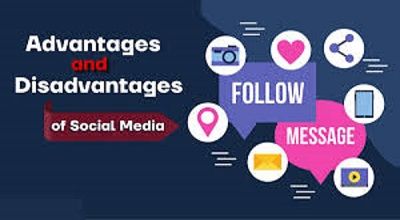Social Media
Social media has become an integral part of modern life, offering numerous advantages and disadvantages. It’s essential to understand both sides of the coin when using or evaluating social media platforms. Here’s a breakdown of the advantages and disadvantages:
Advantages of Social Media:
Connectivity: Social media platforms enable people to connect with friends, family, and acquaintances worldwide, bridging geographical gaps and fostering relationships.
- Information and Awareness: Social media is a powerful tool for disseminating information, news, and awareness campaigns quickly. Making it a valuable resource during emergencies or for spreading important messages.
- Business Opportunities: Social media provides a platform for businesses to reach a vast audience. Promote products and services, and engage with customers directly, often at a lower cost compared to traditional advertising.
- Networking: Professionals can use social media to network, connect with peers, and discover job opportunities, making it a valuable tool for career growth and development.
- Educational Resources: Many educational institutions and experts share valuable knowledge and resources on social media platforms, making it a valuable learning resource.
- Creativity and Expression: Social media platforms allow users to express themselves creatively through photos, videos, blogs, and other content, fostering self-expression and creativity.
- Social Movements: Social media has played a significant role in promoting social and political movements. Allowing activists to mobilize support and raise awareness about important issues.
Disadvantages of Social Media:
- Privacy Concerns: Users often share personal information on social media. Which can be exploited by hackers, advertisers, or malicious actors for identity theft, fraud, or privacy invasion.
- Addiction: Social media platforms are designed to be addictive, and excessive use can lead to mental health issues. Such as anxiety, depression, and loneliness.
- Cyberbullying: The anonymity of the internet can lead to cyberbullying, harassment, and trolling. Which can have severe psychological and emotional consequences for victims.
- Misinformation: False or misleading information can spread rapidly on social media, leading to the proliferation of fake news, conspiracy theories, and misinformation.
- Time Wasting: Excessive use of social media can lead to productivity loss. People spend significant amounts of time scrolling through feeds instead of engaging in productive activities.
- Negative Impact on Mental Health: Constant comparison to others on social media can lead to feelings of inadequacy, low self-esteem, and anxiety.
- Filter Bubbles: Algorithms on social media platforms tend to show users content that aligns with their existing beliefs. Creating filter bubbles that reinforce echo chambers and limit exposure to diverse perspectives.
- Impact on Real Relationships: Overuse of social media can strain real-life relationships. People may prioritize online connections over in-person interactions.
Final Words
In summary, social media offers various benefits, such as connectivity, information sharing, and business opportunities. But it also comes with drawbacks, including privacy concerns, addiction, and the spread of misinformation. Users should be mindful of these advantages and disadvantages to make informed and responsible use of social media.
